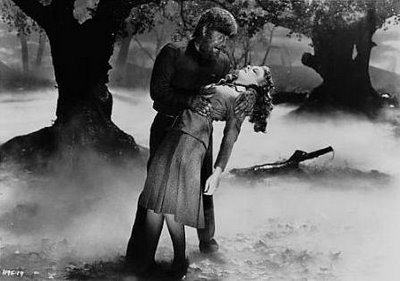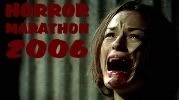The Wolf Man (1941)
 James Whale’s homoerotic subversions aside, the Universal monster films, by their very nature, weren’t exactly open to the greatest range of subtext. This makes it all the more refreshing to see a gem like The Wolf Man, which creates a far more nuanced and affecting personal conflict than many another works with far bigger canvas’s on which to work. Like 1933’s The Invisible Man, there is no true villain at the center of The Wolf Man, only a protagonist whose better intentions have been subverted by an unforeseen conflict in which they were ill-prepared. The plot is miniscule: the always well-meaning Larry Talbot (Lon Chaney Jr., surely making his father proud) returns to his family home after a prolonged absence, meaning to take over the estate when his aging father retires. A night of harmless company with two local girls takes a turn for the worse when one is attacked and killed by a prowling wolf; only Larry sees the creature, and is able to kill it with his silver-capped cane, but not without suffering a bite first. When the policemen arrive at the scene, a dead man lies were the wolf had previously been, and Larry’s wound has mysteriously vanished the following morning. The plot thickens.
James Whale’s homoerotic subversions aside, the Universal monster films, by their very nature, weren’t exactly open to the greatest range of subtext. This makes it all the more refreshing to see a gem like The Wolf Man, which creates a far more nuanced and affecting personal conflict than many another works with far bigger canvas’s on which to work. Like 1933’s The Invisible Man, there is no true villain at the center of The Wolf Man, only a protagonist whose better intentions have been subverted by an unforeseen conflict in which they were ill-prepared. The plot is miniscule: the always well-meaning Larry Talbot (Lon Chaney Jr., surely making his father proud) returns to his family home after a prolonged absence, meaning to take over the estate when his aging father retires. A night of harmless company with two local girls takes a turn for the worse when one is attacked and killed by a prowling wolf; only Larry sees the creature, and is able to kill it with his silver-capped cane, but not without suffering a bite first. When the policemen arrive at the scene, a dead man lies were the wolf had previously been, and Larry’s wound has mysteriously vanished the following morning. The plot thickens.It is more than debatable as to how much of the film’s immense sympathy for its tragic main character comes from Chaney’s immense performance, which even manages to translate through the thick and awkward-looking werewolf makeup during his few scenes of transformation. His mammalian gestures are awkward at first, but come to convey the twisted humanity at the core of the unwilling man who awakens each morning only to learn of a new murder having taken place the night before. His periods of change often leaving him in a state of amnesia afterwards, it takes some time before Larry is even sure that he contracted the curse of the werewolf from his supposed bite, having been half-convinced that all signs of it are but a manifestation of his mind. The script offers little in the way of new material to the genre, but perhaps it is too easy to take for granted the film’s immense sympathy for its characters. Likewise, The Wolf Man features some of the most ravishing use of set design during this era of the genre, particularly emphasizing a sense of depth to create mood, while the swirling smoke and fog often parallels Larry’s own indistinguishable moral quagmire. Many of the best horror films are so because of what the expose within our selves, the fear of being unable to sway one’s own potential for evil being the central conceit here.





Feature: Horror Marathon 2006

